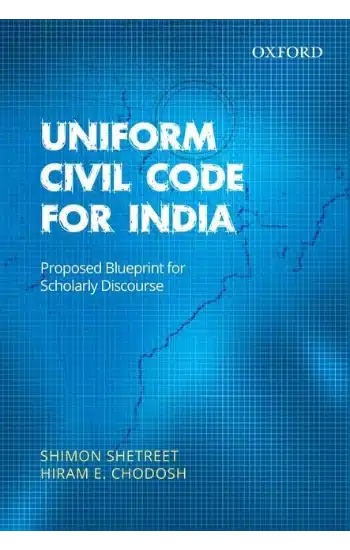
Save: 10%

Save: 10%
Uniform Civil Code for India: Proposed Blueprint for Scholarly Discourse
Publisher:
| Author:
| Language:
| Format:
Publisher:
Author:
Language:
Format:
₹995 ₹895
Save: 10%
In stock
Ships within:
In stock
| Book Type |
|---|
ISBN:
Page Extent:
Article 44 of The Constitution of India, provides that ‘The State shall endeavour to secure for the citizens a Uniform Civil Code throughout the territory of India.’ Even after more than six decades, this anticipated code has not been developed or implemented. This book provides a blueprint for alternative frameworks and courses of action, drawing on lessons from comparative context to develop a Uniform Civil Code for India. It explores the interplay between issues of law, culture, and religion in light of various intra-community and inter-community disputes. The book proposes a series of guidelines and considerations to inform this process. The first guideline urges that the process of preparing and implementing a Uniform Civil Code should be the function of the Legislature. The Courts can resolve certain specific points but the comprehensive code is a legislative function and not for judicial resolution. The second guideline suggests the parallel application of civil and religious law. The securing of a Uniform Civil Code must not negate the possibility of citizens availing themselves of religious law-if they so wish. The third guideline advises a gradual application of a Uniform Civil Code. The development of the code should be done topic by topic, chapter by chapter. The fourth guideline is to deploy tools of mediation in both the formation of the code and its implementation. This mediation should take on two forms – intercommunity mediation and individual mediation. The first of these two relates to a dialogue between the communities of India, to advance an agreement upon the substantive provisions of the Uniform Civil Code. The second relates to mediation between individuals, in occasions where dispute arises in the realm of personal law.
The proposed blueprint derives guidance from the experience of other nations and the many ways in which they have faced the challenge of introducing a civil code and maintaining respect for local community laws and social customs. The blueprint also focuses on the relationships between religion and the state. This set of proposals should alleviate the suspicion of the Muslim community or the Hindu majority community. A Uniform Civil Code can be developed to achieve two simultaneous objectives: to maximize the sustainability of traditions and community values while also reinforcing constitutional values that prevent discrimination and, in particular, unfair practices to girls and women in a democratic country.
Article 44 of The Constitution of India, provides that ‘The State shall endeavour to secure for the citizens a Uniform Civil Code throughout the territory of India.’ Even after more than six decades, this anticipated code has not been developed or implemented. This book provides a blueprint for alternative frameworks and courses of action, drawing on lessons from comparative context to develop a Uniform Civil Code for India. It explores the interplay between issues of law, culture, and religion in light of various intra-community and inter-community disputes. The book proposes a series of guidelines and considerations to inform this process. The first guideline urges that the process of preparing and implementing a Uniform Civil Code should be the function of the Legislature. The Courts can resolve certain specific points but the comprehensive code is a legislative function and not for judicial resolution. The second guideline suggests the parallel application of civil and religious law. The securing of a Uniform Civil Code must not negate the possibility of citizens availing themselves of religious law-if they so wish. The third guideline advises a gradual application of a Uniform Civil Code. The development of the code should be done topic by topic, chapter by chapter. The fourth guideline is to deploy tools of mediation in both the formation of the code and its implementation. This mediation should take on two forms – intercommunity mediation and individual mediation. The first of these two relates to a dialogue between the communities of India, to advance an agreement upon the substantive provisions of the Uniform Civil Code. The second relates to mediation between individuals, in occasions where dispute arises in the realm of personal law.
The proposed blueprint derives guidance from the experience of other nations and the many ways in which they have faced the challenge of introducing a civil code and maintaining respect for local community laws and social customs. The blueprint also focuses on the relationships between religion and the state. This set of proposals should alleviate the suspicion of the Muslim community or the Hindu majority community. A Uniform Civil Code can be developed to achieve two simultaneous objectives: to maximize the sustainability of traditions and community values while also reinforcing constitutional values that prevent discrimination and, in particular, unfair practices to girls and women in a democratic country.
About Author
Reviews
There are no reviews yet.
Related products
The Framing of India’s Constitution (In 6 Volumes)
Save: 20%
Environmental Law and Policy in India: Cases and Materials
Save: 15%
RELATED PRODUCTS
Environmental Law and Policy in India: Cases and Materials
Save: 15%
COMPETITION LAW TODAY 2Ed: Concepts, Issues, and the Law in Practice
Save: 10%
Handbook for Independent Director’s Examination (With MCQs) – 2nd edition
Save: 10%
Taxmann’s Corporate Laws (Set of 2 volumes) – 46th Edition
Save: 10%
The Framing of India’s Constitution (In 6 Volumes)
Save: 20%



Reviews
There are no reviews yet.